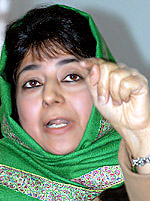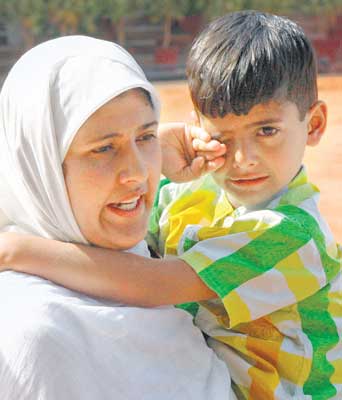Srinagar, Feb 9: Terming the execution of Parliament attack convict Afzal Guru today as disappointing, opposition PDP President Mehbooba Mufti demanded handing over his body to the family for last rites.
"While the hanging should not have been carried out, the return of Afzal's body was the least the government could do to show its concern for humanitarian values," the PDP president said in a statement here.
Mehbooba said the PDP believed that whatever the requirements of legal process, there was a need for the government to take into consideration the overall political impact of this execution, which is the reason why the option of mercy has been provided under the constitution.
She said the PDP had, keeping this in view, made an appeal to the President of India in 2011 to grant clemency to Guru and commute his death sentence into life imprisonment.
"We feel that at a time when there is a need to step up measures to reduce the trust deficit between the state and rest of the country, the execution of Afzal Guru could produce results to the contrary. Our party is generally in favour of scrapping death penalty from the statute book and we reiterate that position once again," Mufti said.
Referring to Chief Minister Omar Abdullah's claim that he had no role in carrying out the execution, Mehbooba said the state government cannot be absolved of its responsibility in taking this crucial decision that can have long term political implications on the state.
"The NC is part of the UPA and it must share the responsibility for this decision. Power sharing can't be in isolation of sharing the fallout of decisions," she said.
Appealing for restraint in expression of feelings, Mehbooba said the people of the state have already suffered too long and too much "at the hands of this trigger happy government with loss of life in 2010 only the latest which awaits closure."
Condemning the use of force on protesters at various places, especially in Baramulla district, Mehbooba said the government has once again exposed its "trigger happy" nature. She said many have been wounded in police action and reportedly about a dozen of them have sustained bullet injuries.
"Contrary to elsewhere in the country, in Kashmir, bullet seems to be the preferred weapon of the forces which unfortunately contributes to cynicism, alienation and anger apart from killing, maiming and disabling countless people trying to use their democratic right to protest," she added.
Afzal Guru prayed this morning before hanging: jail officials
New Delhi, Feb 9: Afzal Guru, who was hanged today for his role in the attack on Parliament in 2001, was remorseless when he was taken to the gallows in the morning.
Senior Tihar Jail officials who oversaw the entire preparation for hanging of Guru said he was "very peaceful" and "calm" during the final moments and did not appear repentant.![]()
"He was very peaceful and calm during the final moments. He looked very composed," a top Tihar Jail official said.
The official said Guru, who was lodged in Jail No.3 of the prison, was informed about his impending execution last evening and looked a "little shaken" thereafter.
A resident of Sopore in north Kashmir, 43-year-old Guru was executed at 8 AM near Jail No.3 in a top-secret operation.
A magistrate, a doctor and senior prison officials were present during his execution.
Another official said Guru was woken up at around 5 AM and was served tea. He offered Namaz immediately after getting up. "He was taken to the gallows at 7:30am," the official said.
Asked whether he was remorseless in his final moments, Director General of Prisons Vimla Mehra said, "He was happy and healthy. That answers your question."
A doctor carried out a health check up of Guru before he was taken to gallows near his cell. Mehra said normal procedure was followed in the hanging.
His body was buried inside the prison complex soon after his execution. "He (Guru) was buried near Jail No.3 with full religious rites," said another Tihar Jail official.
A Maulavi performed religious rites. Guru spent over 10 years on death row in the Tihar prison after being convicted in the audacious attack on Parliament in 2001.
The jail authorities refused to share any details about whether he had any last wish or about any final words.
Guru, a former fruit merchant, was found guilty of conspiring and sheltering the militants who attacked Parliament on December 13, 2001, in which nine persons were killed.
The mercy plea of Guru, who was sentenced to death in 2002 by a special court and later upheld by the Supreme Court in 2005, was rejected by President Pranab Mukherjee on January 3.
The family of Guru residing in Sopore in north Kashmir was informed about the decision of the Government that his mercy petition has been rejected.
However, Guru's lawyers Nandita Haksar and N Pancholi said his family was not informed about the government decision to hang him.
The lawyers said the family came to know about Guru's hanging only through news channels.
"The family was not informed about the decision. They came to know only through news channels. The family is in Sopore. They cannot come due to curfew," the lawyers said.
Family learnt about execution later: Afzal cousin
Jammu, Feb 9: Parliament attack convict Afzal Guru's family said they were not told in advance about his hanging Saturday morning and want his body.
Yaseen Guru, a cousin of Afzal Guru, said: "It is all rubbish that we were told before the execution... We came to know about it through the media."
Yaseen said the family was not told that President Pranab Mukherjee had rejected his mercy petition.
"I can say with confidence that my brother (Afzal Guru) did not get a fair trial," Yaseen added.

Afzal's wife Tabassum with son Ghalib
He said Afzal Guru's wife Tabassum was in a state of deep shock. "All that she and the rest of the family now want is his body."
The man had been buried within the premises of New Delhi's Tihar Central Jail where he was hanged.
Yaseen told: "Not only the family but the whole of Kashmir is shocked and grieved over the hanging."
Afzal Guru, who hailed from Sopore in north Kashmir, was hanged after being convicted for his role in the Dec 13, 2001 attack on Indian parliament that almost led to a war between India and Pakistan.
Also Read: A meeting inside jail with Afzal Guru
Earlier report:
Afzal Guru hanged, buried in Tihar jail
New Delhi, Feb 9: Afzal Guru, convicted in the audacious attack on Parliament in 2001, was on Saturday hanged in Tihar Jail, in an operation shrouded in secrecy.
“Afzal Guru was hanged at 8 a.m.,” Home Minister Sushilkumar Shinde said shortly after the execution of the 43-year-old Kashmiri, alleged to be a member of Jaish-e-Mohammad.
The mercy plea of, who was sentenced to death in 2002 by a special court and later upheld by the Supreme Court in 2004, was rejected by President Pranab Mukherjee a few days back, Rashtrapati Bhavan spokespeman Venu Rajamony said.
Reminiscent of the hanging of Mumbai attack convict Ajmal Kasab on November 21, 2012 Guru’s execution was kept under wraps in a top secret operation.
The family of Guru residing in Sopore in north Kashmir was informed about the decision of the government that his mercy petition has been rejected.
Guru was buried inside the prison complex soon after his execution.“He (Guru) was buried near jail number three,” a top Tihar Jail official said.
Curfew was imposed in the Kashmir Valley in the wee hours of Saturday. Jammu and Kashmir Chief Minister Omar Abdullah, DGP Ashok Prasad and other senior officers flew from Jammu to Srinagar early this morning to keep a close watch on the law and order situation.
Pro-Pakistan separatist groups have given a call for a three-day shut down in the Valley.
Guru was convicted on charges conspiracy in the December 2001 attack on Parliament.
On December 13, 2001, five heavily-armed gunmen stormed the Parliament complex and opened indiscriminate fire, killing nine persons.
They included five Delhi Police personnel, a woman Central Reserve Police Force (CRPF) official, two Parliament watch and ward staff and a gardener.
A journalist, who was injured, died later. All five terrorists were shot dead.





Comments
Add new comment